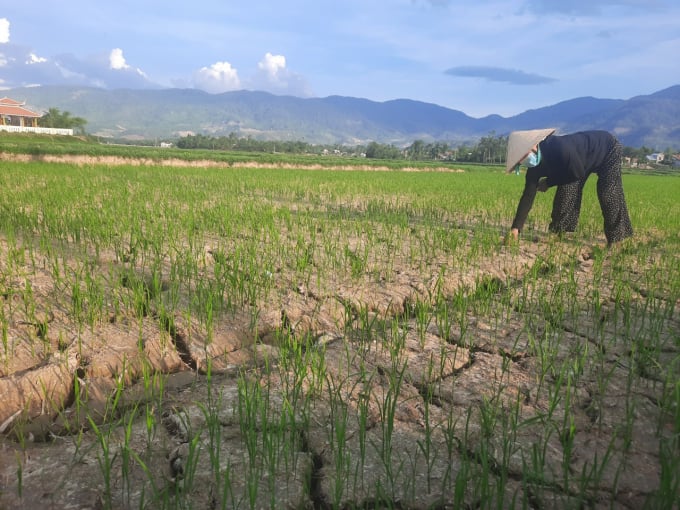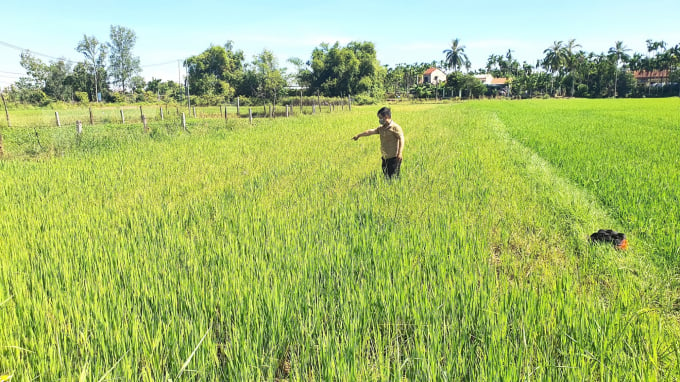May 31, 2025 | 06:19 GMT +7
May 31, 2025 | 06:19 GMT +7
Hotline: 0913.378.918
May 31, 2025 | 06:19 GMT +7
Hotline: 0913.378.918
Weather with continuous heat and almost no rain since the beginning of summer-autumn crop has caused difficulties for agricultural production in Quang Nam Province. Although localities have taken many measures to cope with the situation, water shortage still occurs especially in localities at the end of irrigation canals.

Many fields in Quang Nam are drying up and cracked due to a lack of water irrigation. Photo: L.K.
In Cam Kim Commune (Hoi An City), it was warned that since the beginning of the crop, there would not be enough water for irrigation, so the agricultural sector had authorized to convert about 10 hectares of the rice area to other crops. In the summer-autumn crop of 2021, the whole commune will grow about 40 hectares of rice. However, up to now, many fields which had been sown for a month, start to show signs of withering due to lack of water.
Ms. Nguyen Thi Hoa, 68, in village 3, Cam Kim Commune said that her family's rice fields of nearly 1.5 sao (about ... ha) have never been suffering a shortage of water like this year. The rice is in a developing period, so it needs water and fertilization. Butt now, her fields are able to be watered only once every five days.
“This land is acacia soil, so if it is not continuously watered, it dries very quickly. Rice plants cannot grow without enough water. In many areas, leaves have turned yellow. The last time there was water, I also took advantage to fertilize the fields, but now the water has dried up and I don't know if it has any effect", Ms. Hoa lamented.
Like Cam Kim, Duy Vinh Commune (Duy Xuyen District) is also located at the end of the irrigation canal, so it faces many difficulties with water resources. Along with that, saline water intrusion is hitting many areas of summer-autumn rice there resulting in a risk of yield loss.
Mr. Huynh Ngoc Hung, Director of Duy Vinh Cooperative, said that in this crop, the whole commune produces about 60 hectares of rice, but only 40 hectares of which have temporarily enough water. The remaining 20 hectares always face drought and salinity. Especially, in the past 10 days, this situation has become very serious.
“We have to ask the pumping stations to support by trying to take water tide to pump out to the serious water-deficient areas in Duy Vinh to save rice. However, each day the station can only pump for a few hours, but not constantly so, in the coming time, it is necessary to take into account some other measures to ensure water supply for the summer-autumn rice area," said Hung.

Many rice fields have begun to turn yellow due to insufficient water. Photo: L.K.
In Nong Son District, the water shortage is even more serious when tens of hectares of rice fields in this locality have cracked. Mr. Tran Van Luu, the district’s Deputy Director of Agriculture Service Center, said that according to the plan in this year's summer-autumn crop, the whole district will sow more than 831 hectares.
Up to now, this district has sown 595 hectares (70%) but due to water insufficiency, farmers have to accept to give up the remaining target areas. Among the sown areas, up to 230 hectares are at risk of drought, of which 55 hectares are suffering heavy conditions.
“In fields located at the end of the canal, there is no water to lead there. In particular, it has not rained in many weeks in the area, although it has previously planned to combat drought, there is no source of water to pump, so it is also helpless," said Mr. Luu.
According to Mr. Do Van Tung, Director of Quang Nam Province Irrigation Exploitation One Member Ltd.Company, to cope with drought and salinity, many localities in the province have requested to provide irrigation water for affected rice areas.
In districts such as Duy Xuyen and Dai Loc, due to the influence of drought and salinity, local-managed pumping stations cannot supply water to serve irrigation pumps. For example, May 19 pumping station serving Duy Xuyen District had to stop working at some point due to saline water, so far it has not been able to operate.

Pumping stations are affected by saltwater, so they cannot operate at full capacity. Photo: L.K.
"Therefore, we have directed to take water from Xuyen Dong pumping station to irrigate about 85 hectares of rice in Duy Xuyen District. Besides, in Dai Loc District, because the water source in Bau Thach Bo has been dried out, the company has taken water from Ai Nghia pumping station to supply more than 40 areas of summer-autumn rice here," said Mr. Do Van Tung.
In this summer-autumn crop, Quang Nam Province sowed 41,000 hectares of rice, of which nearly 38,000 hectares were irrigated, the remaining depends on water from the sky. Right from the beginning of the crop, Quang Nam's agricultural sector has advised localities to change the crop structure, reduce the rice areas at the end of the canal, which are at risk of water shortage to limit the impact on farmers.
Mr. Truong Xuan Ty, Deputy Director of Quang Nam Department of Agriculture and Rural Development, said: “Due to the hot weather, drought and salinity occurred. The particular effected areas are concentrating in Duy Xuyen and Dien Ban districts... To solve this situation, the Department is coordinating with Song Tranh 2 Hydropower Plant, at the same time based on the high tide, to discharge water to ensure pumping stations irriagting enough water for the fields.
Translated by Van Trang

(VAN) Vaccinating juvenile pangasius helps reduce disease, antibiotic use, and farming costs, increasing profits for export-oriented farmers in An Giang.

(VAN) Due to a limited supply of workforce and competitive recruitment requirements, businesses struggle to retain talented veterinary human resources.

(VAN) WOAH’s guidance aims to mitigate disease risks through a One Health approach that balances economic, conservation, and public health interests.

(VAN) Ms. Nguyen Thi Dung, Deputy Director of Ngoc Hoang Cooperative, shared about the journey of bringing dragon fruit to Europe, achieving annual revenues in the billions of VND.

(VAN) Bamboo products from Thang Tho Bamboo Cooperative have reached many countries around the world, while also creating jobs for local workers.

(VAN) The Management Board of Con Dao National Park reported that a green sea turtle, tagged in the Philippines, has traveled thousands of kilometers to lay 84 eggs on Bay Canh Islet.

(VAN) Green technology is paving a new path for sustainable aquaculture in the Mekong Delta in particular and across the country in general, helping reduce emissions and adapt to climate change.